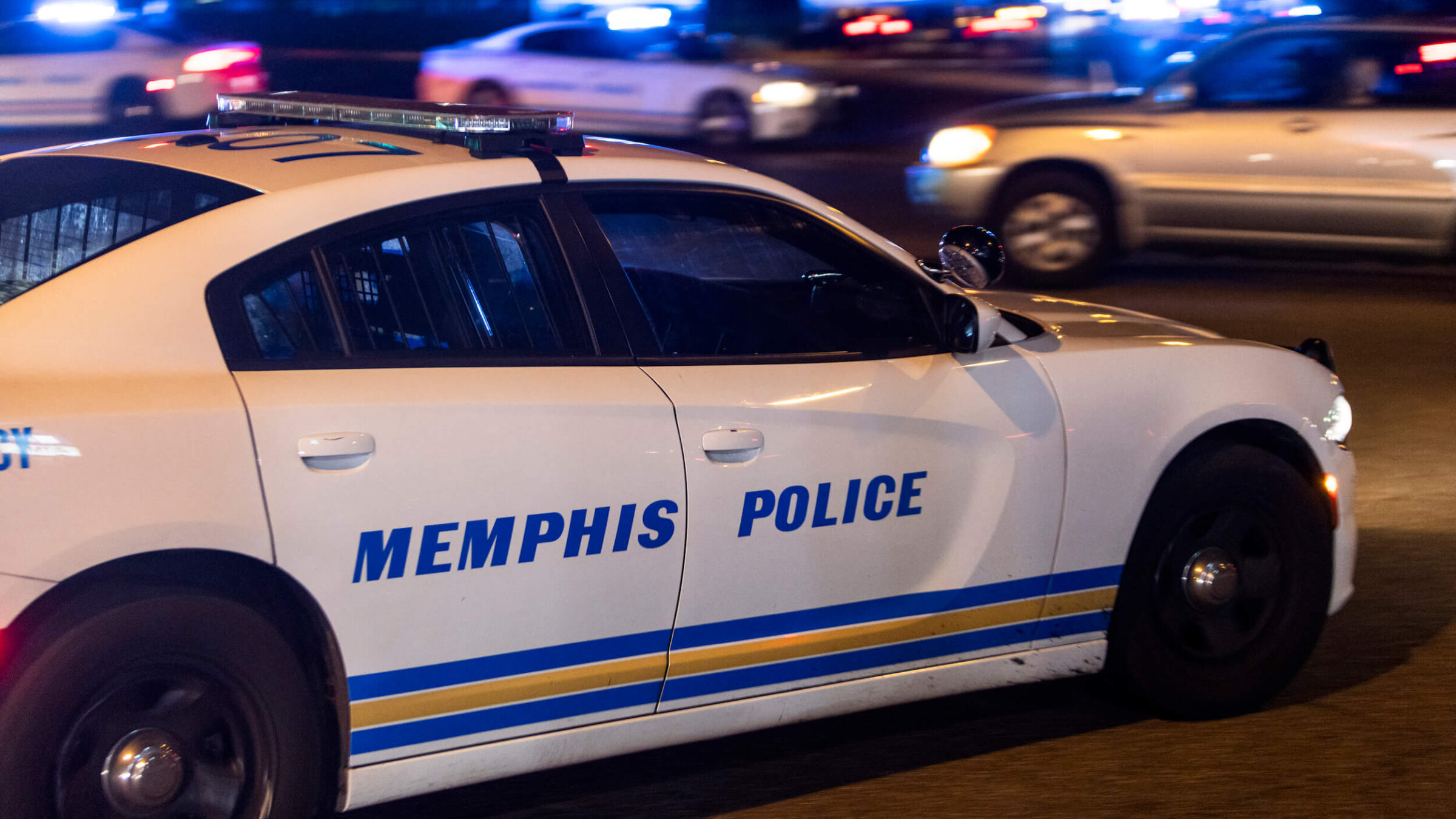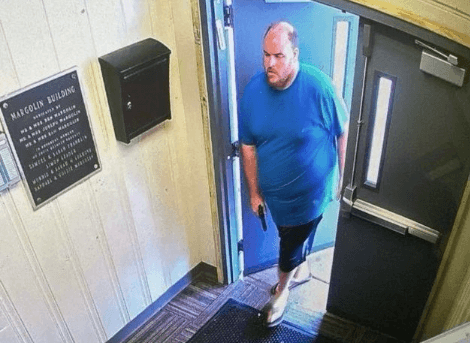Man who allegedly fired shots at Jewish school shared grievances against it, flashbacks of father’s violent death
His father was fatally shot by Memphis police 20 years ago

The Tennessee Bureau of Investigation would not confirm the identity of the shooter who attempted to attack a Memphis Jewish school on Monday. Photo by Brad Vest/Getty Images
This is a developing story.
The man who allegedly tried to enter his former Jewish high school with a gun on Monday described a grievance about his alma mater, an examination of his post history reveals.
In the same post, he described being haunted by the death of his father, who was fatally shot by Memphis police outside his childhood home 20 years ago.
Joel Bowman, identified by the Tennessee Bureau of Investigation Wednesday as the suspect in the thwarted attack on Margolin Jewish High School, was shot and apprehended by police, and is currently in critical condition at a Memphis hospital.

The alleged gunman’s mother filed a lawsuit against the city in 2010 in which she accused police of needlessly killing her husband in 2003, and argued that the ordeal had left her and her son emotionally distraught. The city argued that Dr. Anthony J. Bowman posed a threat to others, and the lawsuit was dismissed.
Authorities said Bowman drove up to the Orthodox school in a maroon pick-up truck and entered through an exterior door, where security cameras captured him holding a handgun. He turned around after locked security doors prevented him from gaining access to the rest of the building.
“Agents determined Bowman fired shots in the immediate area before driving away,” the TBI wrote in a blog post Wednesday.
The only people in the school were several staff members and construction workers, and they were not hurt.
“Thankfully, that school had a great safety procedure and process in place and avoided anyone being harmed or injured at that scene,” said Don Crowe, assistant chief in the Memphis Police Department.
‘Trapped in my own head’
Bowman, 33, posted four times on Facebook on Monday, the day of the shooting, including at 12:55 p.m., about 25 minutes before authorities say he arrived at the school.
“Gots time on my hands. ‘Home’ court visit,” wrote Bowman, who graduated from the school in 2009, when it was called Cooper Yeshiva, and had played as a starter on the school’s basketball team.
It was unclear why Bowman allegedly returned to campus Monday with a gun. But his Facebook posts depict a man shattered by family tragedy and struggling with intense mood swings. In the same week that he gushed about friends he had made at the school, he lashed out at his alma mater’s failure to understand him.
In a July 25 post, Bowman wrote that he suffered from complex post-traumatic stress disorder, as well as dysgraphia — a neurological disorder affecting writing ability — and ADHD. He implied those conditions were only recently diagnosed, but that he experienced symptoms of them while a student.
“Having this info now, makes it EXTREMELY HARD to be appreciative of ANY time I spent in ‘School,’” Bowman wrote. “Constantly being told I was Lazy, Un-driven, Dumb, Angry, Weird, A Loner, Letting my Father down…”
Bowman also said that he had been haunted by flashbacks of his father’s death.
“I’ve been trapped in my own head with 20 years worth of ‘talking’ to do,” Bowman wrote.
A few well-wishers commented on the post.
Other Bowman posts in the last seven days included lengthy tributes to people who supported him growing up and implied that he had made a recent trip to a gun shop.
“Genuinely to the core, I don’t think he would ever intentionally hurt someone,” Brittney Eshelman-Worch, who attended the school, told WREG. “He has struggled with mental health for a number of years.”
She said his father’s shooting traumatized the younger Bowman: “I think it was like nine or 10 police officers all opened fire at the same time and completely mutilated him.”
Death of Dr. Bowman
Police shot Dr. Bowman on May 14, 2003, after they responded to a 911 call from Joel Bowman’s mother, Susan, in which she said that her husband was acting erratically and taking medication for bipolar disorder. He had run out of their house pointing a handgun at his own head.
According to his son’s Facebook page, Dr. Bowman was a cardiologist who trained at the University of Guadalajara in Mexico. A death notice published in the local newspaper at the time encouraged donations in his memory to be given to Margolin Hebrew Academy.
In the 2010 lawsuit Susan Bowman filed against the city of Memphis, she alleged that “though emotionally disturbed, Dr. Bowman was not a threat to anyone else.”
In addition to the emotional distress suffered over Dr. Bowman’s violent death, she said she and her son had also been harmed by what the lawsuit described as an “illegal search” of her home.
Ronald Krelstein, the lawyer who represented Susan Bowman, did not immediately respond to inquiries from the Forward.
Anthony Bowman’s death and that of another man at the hands of Memphis officers on the same day prompted the Memphis Police Department to pilot the use of nonlethal weapons such as Tasers, the local newspaper reported at the time.
Susan Bowman’s complaint was ultimately dismissed in 2010 because she could not “in good faith allege that the police officers’ conduct … was motivated by considerations of race, color, religion, ancestry or national origin,” a requirement of the statute under which she had pursued compensation, according to the ruling by a Tennessee court.
Yelling ‘at Hashem’
By then, Joel Bowman had finished high school and received a scholarship to attend Lev HaTorah, a yeshiva in Israel, during the 2009-2010 academic year. The scholarship was named after Alisa Flatow, a Brandeis University student who was killed in a suicide bombing in Gaza in 1995.
An estimated 10,000 Jews live in the Memphis area, according to a 2006 analysis by the local Jewish federation. Many of them are affiliated with the city’s Orthodox community, which is unusually dense for a Southern city. The historic Baron Hirsch Synagogue boasts of being the largest Orthodox congregation in the United States, and the community has also been chronicled in bestselling novels by the Jewish writer Tova Mirvis.
But faced with an aging population, the Orthodox community has sought to attract new families in recent years. Bowman had been one of only two boys in his Margolin Hebrew Academy class for a few years in elementary and high school, his former classmate told JTA, and he stayed in Memphis after many of his classmates left.
Public posts on Bowman’s Facebook page, where he had posted about basketball games and punk concerts during high school, offer little information about his life following his time in the school. He posted about Suicide Prevention Day in 2019 and in April of this year posted an image of Lucy, Maia and Rina Dee, Jews murdered in a shooting attack in the West Bank.
In the last week, Bowman’s public posts became more frequent. Only July 24, he posted that he was on the verge of launching a farm and flower business.
On Saturday, he posted a picture of his father’s grave, located in the Anshei Sphard Cemetery in Memphis. In an extended, disjointed post accompanying the picture, he wrote about having a “therapy breakthrough” and said, using a Hebrew term for God, that he had “yelled at Hashem” at the gravesite.
Addressing the universe, Bowman wrote, “Please allow me to keep my calm, to remember to breathe, and to REMEMBER WHO I COME FROM.”
JTA contributed to this report.
Correction: An earlier version of this article misidentified Memphis Police Department Assistant Chief Don Crowe.























